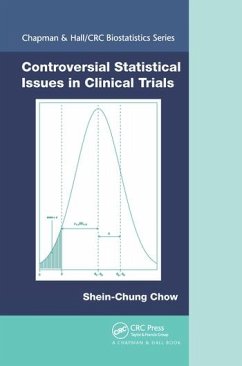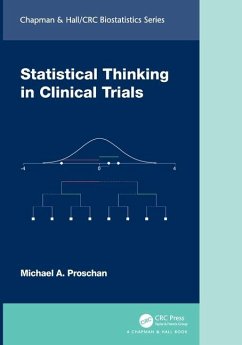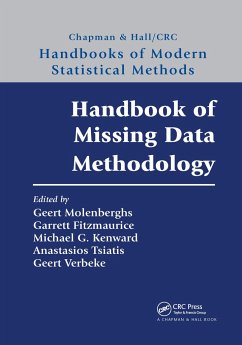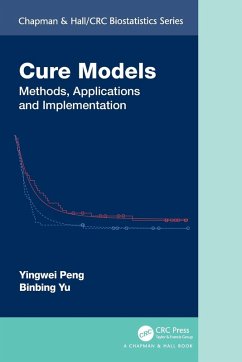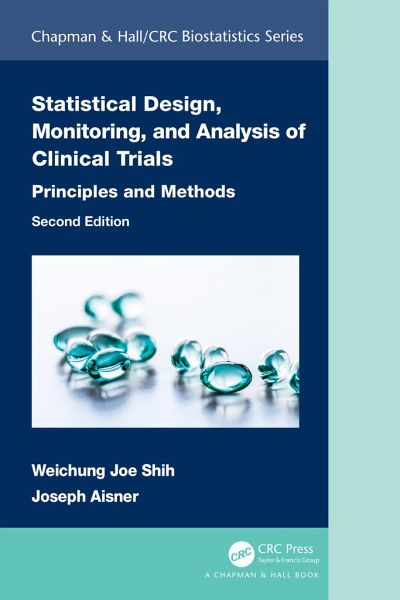
Statistical Design, Monitoring, and Analysis of Clinical Trials
Principles and Methods
Versandkostenfrei!
Versandfertig in 6-10 Tagen
96,99 €
inkl. MwSt.
Weitere Ausgaben:

PAYBACK Punkte
48 °P sammeln!
Statistical Design, Monitoring, and Analysis of Clinical Trials, Second Edition concentrates on the biostatistics component of clinical trials. This new edition is updated throughout and includes five new chapters.Developed from the authors' courses taught to public health and medical students, residents, and fellows during the past 20 years, the text shows how biostatistics in clinical trials is an integration of many fundamental scientific principles and statistical methods. The book begins with ethical and safety principles, core trial design concepts, the principles and methods of sample s...
Statistical Design, Monitoring, and Analysis of Clinical Trials, Second Edition concentrates on the biostatistics component of clinical trials. This new edition is updated throughout and includes five new chapters.
Developed from the authors' courses taught to public health and medical students, residents, and fellows during the past 20 years, the text shows how biostatistics in clinical trials is an integration of many fundamental scientific principles and statistical methods. The book begins with ethical and safety principles, core trial design concepts, the principles and methods of sample size and power calculation, and analysis of covariance and stratified analysis. It then focuses on sequential designs and methods for two-stage Phase II cancer trials to Phase III group sequential trials, covering monitoring safety, futility, and efficacy. The authors also discuss the development of sample size reestimation and adaptive group sequential procedures, phase 2/3 seamless design and trials with predictive biomarkers, exploit multiple testing procedures, and explain the concept of estimand, intercurrent events, and different missing data processes, and describe how to analyze incomplete data by proper multiple imputations.
This text reflects the academic research, commercial development, and public health aspects of clinical trials. It gives students and practitioners a multidisciplinary understanding of the concepts and techniques involved in designing, monitoring, and analyzing various types of trials. The book's balanced set of homework assignments and in-class exercises are appropriate for students and researchers in (bio)statistics, epidemiology, medicine, pharmacy, and public health.
Developed from the authors' courses taught to public health and medical students, residents, and fellows during the past 20 years, the text shows how biostatistics in clinical trials is an integration of many fundamental scientific principles and statistical methods. The book begins with ethical and safety principles, core trial design concepts, the principles and methods of sample size and power calculation, and analysis of covariance and stratified analysis. It then focuses on sequential designs and methods for two-stage Phase II cancer trials to Phase III group sequential trials, covering monitoring safety, futility, and efficacy. The authors also discuss the development of sample size reestimation and adaptive group sequential procedures, phase 2/3 seamless design and trials with predictive biomarkers, exploit multiple testing procedures, and explain the concept of estimand, intercurrent events, and different missing data processes, and describe how to analyze incomplete data by proper multiple imputations.
This text reflects the academic research, commercial development, and public health aspects of clinical trials. It gives students and practitioners a multidisciplinary understanding of the concepts and techniques involved in designing, monitoring, and analyzing various types of trials. The book's balanced set of homework assignments and in-class exercises are appropriate for students and researchers in (bio)statistics, epidemiology, medicine, pharmacy, and public health.








